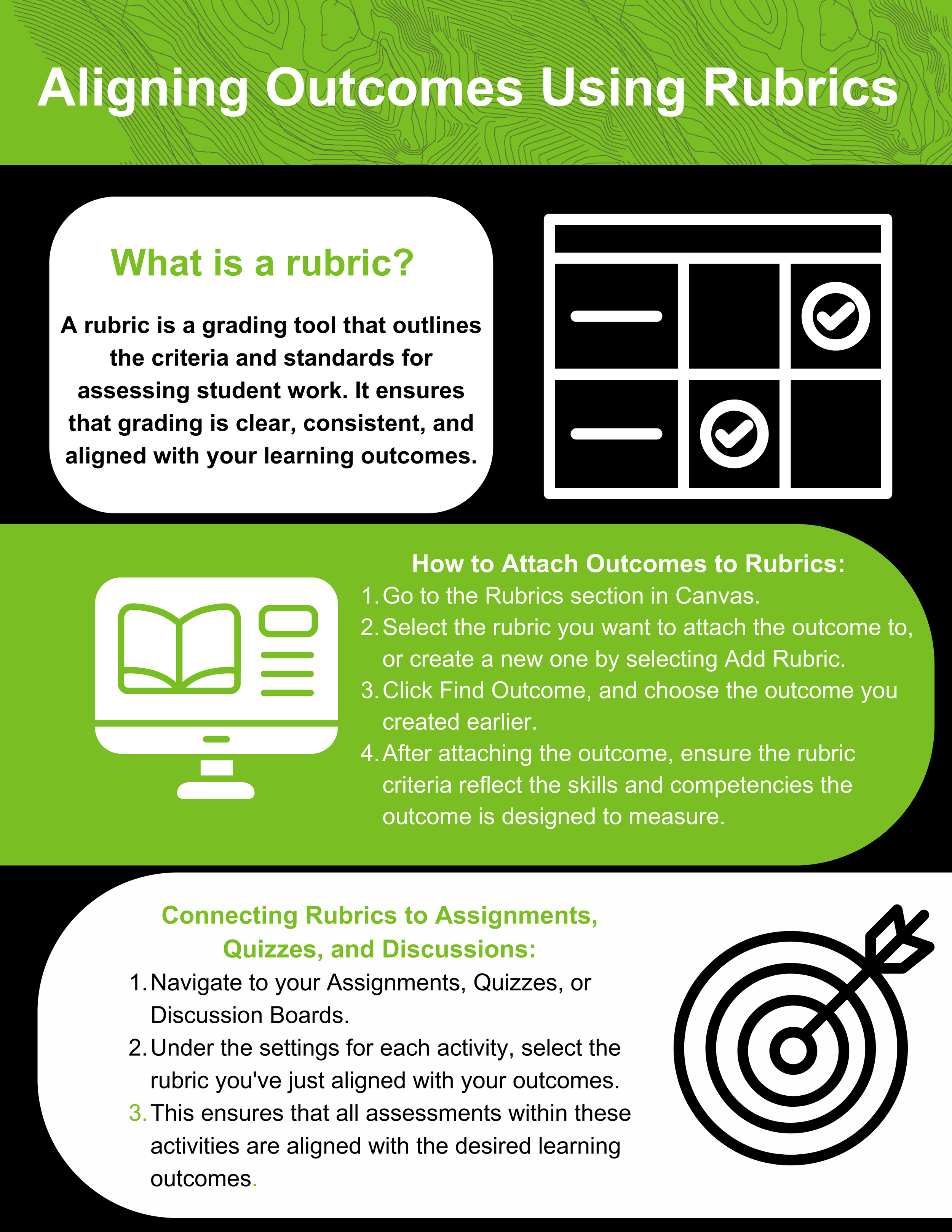Graduate Capstone Project
Canvas Outcomes eLearning Module for Edson College
As the sole designer and developer, I undertook the task of creating the "Track to Success: Mastering Canvas Outcomes" eLearning module, a project that combined my instructional design expertise and creativity to address a critical need for the faculty and staff at Edson College of Nursing. This course, which also served as my graduate capstone project, was designed to empower faculty with the tools to implement outcome-driven learning through Canvas Outcomes while accommodating their demanding schedules.
Due to security reasons, this eLearning module is not open for non ASU community members to participate. Feel free to check out the sample screenshots from the course!
The Need
Faculty at Edson College expressed challenges with time constraints and a need for concise yet impactful training on Canvas Outcomes. They required a solution that could seamlessly integrate into their busy professional lives, providing the knowledge and skills to align course objectives with program goals, track student mastery, and support accreditation efforts.
My Process
Research and Needs Assessment
I began by conducting a thorough needs assessment to understand faculty pain points and expectations. This phase revealed the importance of microlearning and flexible training solutions.
Design and Development: Using instructional design best practices, I crafted a 60-minute course structured into five self-paced microlearning modules. I incorporated Universal Design for Learning (UDL) principles to ensure accessibility and inclusivity. Each module featured:
Multimedia Content: I designed a comprehensive suite of multimedia elements, including high-quality videos and visually engaging graphics. Using Camtasia, I edited video tutorials to provide clear, step-by-step guidance. Adobe Premiere allowed me to refine the video content, ensuring a polished and professional presentation, while Canva was instrumental in creating accessible and visually appealing graphics that adhered to ASU's branding guidelines. These elements worked together to deliver an immersive and visually cohesive learning experience.
Active Learning: Hands-on activities, such as workbook reflections and sandbox practice, were thoughtfully designed to meet different learning preferences and enhance real-world application. The workbook provided a reflective space for participants to connect theory to their own teaching contexts, promoting deeper understanding through self-directed inquiry. In contrast, the sandbox practice offered a hands-on, experimental environment where participants could actively engage with Canvas Outcomes, build confidence through trial and error, and directly apply new skills in a practical setting.
Scaffolding: The content progressively guided learners from foundational knowledge to actionable application, fostering confidence and mastery. This approach was rooted in adult learning theories such as Malcolm Knowles' principles of andragogy, which emphasize self-direction, practical application, and relevance to learners' professional experiences. By scaffolding the learning experience, participants could build on their existing knowledge, engage with authentic tasks, and see immediate value in applying their new skills, aligning closely with their roles as educators.
Implementation: The course was built entirely within Canvas LMS at the request of the Edson College team, as this platform allows for easier long-term maintenance compared to external tools like Articulate Rise. I carefully designed navigation and interactive elements to enhance the learning experience while ensuring the course remained scalable and accessible for future updates by faculty and instructional designers.
Evaluation and Feedback: Post-course surveys and Canvas Analytics provided valuable insights. Participants highlighted the flexibility and clarity of the course, with one faculty member noting, “The video plus hands-on practice was helpful and informative.” Another commented on the workbook’s value in connecting theoretical learning to their teaching context, while the sandbox activities were praised for their practicality. These data informed iterative improvements, ensuring the course met its instructional goals effectively.
Infographic that accompanied video demo for accessing Canvas Outcomes.
The Outcome
The course exceeded expectations, receiving high praise for its clarity, relevance, and engagement. Highlights included:
100% of participants agreed the course demonstrated the value of outcome-driven learning, with one participant noting, "This course helped me see how outcome-driven learning can directly enhance my teaching goals."
Participants reported increased confidence in using Canvas Outcomes. One faculty member shared, "The video plus hands-on practice was helpful and informative, making the content approachable and practical."
Foundational content like "What is Outcome-Driven Learning?" saw the highest engagement, reflecting the effectiveness of the course in addressing key needs and making theoretical concepts accessible to participants.
What I’m Proud Of
Completing this project single-handedly was both a challenge and a privilege. From content planning and media creation to evaluation, every detail reflected my commitment to creating an impactful learning experience. The course’s structured approach and diverse activities ensured it met the unique needs of every learner, making a tangible difference in how faculty approached their teaching practices.
This project showcases not only my instructional design skills but also my ability to listen to stakeholders, adapt to constraints, and deliver innovative solutions. It exemplifies my passion for designing meaningful, learner-centered training that drives real results.


